Year in Review: Renter protections, Grayson Power Plant among Glendale’s top stories in 2019
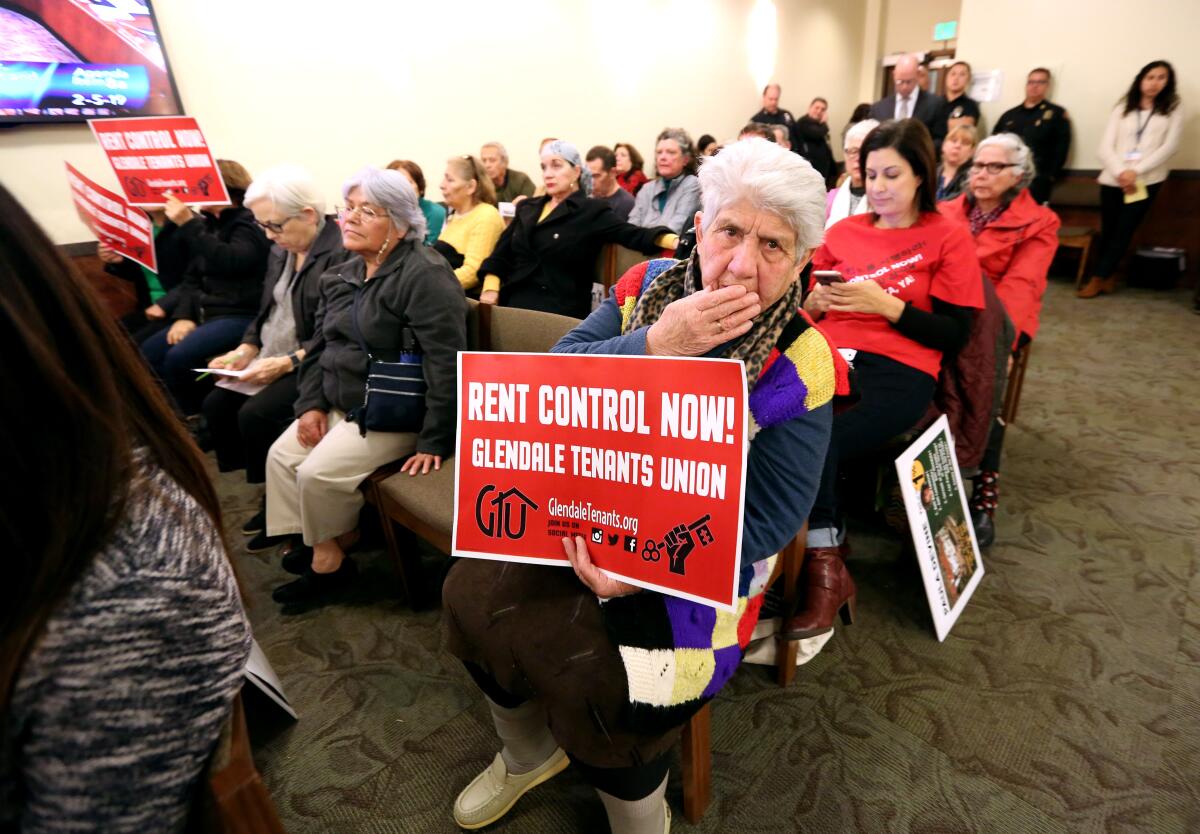
- Share via
Following are highlights from the top stories of 2019 in the Glendale News-Press:
Ordinance passed to help protect renters
After months of heated discussion about how to keep Glendale tenants struggling with rising rents in their homes — while balancing the rights of landlords and property owners — local officials passed in February what was considered a compromise ordinance.
Under the Right to Lease Ordinance, Glendale landlords are required to offer their tenants a one-year lease and pay relocation fees if the rent is hiked more than 7% and the tenant opts to leave.
The regulations went into effect in mid-March, at which point landlords were supposed to roll back rental rates to where they had been on Sept. 18, 2018.
“My goal is to help tenants and to do no harm to landlords, and I hope that that’s what I’m doing,” Glendale City Councilwoman Paula Devine said about a week before the final ordinance was approved.
A similar ordinance was floated in 2017, but was not adopted. The conversation was, in part, reignited in September when the L.A. County Supervisors passed a temporary rent freeze in the county’s unincorporated areas, which include communities in north of Glendale and west of La Cañada Flintridge.
California’s affordable-housing shortage had already become a familiar talking point in local, state and national media.
Renter’s rights activists, at the time, demanded something similar from Glendale City Council members. Several current and former council members, including Vrej Agajanian and Zareh Sinanyan, signaled at least initially that they would support a rent cap or rent control.
Soon, the discussion drew in equally impassioned property owners, who pushed back against the notion of rent control or a cap.
California legislators passed in September a statewide rent cap that will limit annual rent increases to 5%, after inflation. It also offers new barriers to eviction.
Grayson Power Plant stirs controversy
Glendale’s aging Grayson Power Plant is slated to be rebuilt with significantly less natural gas infrastructure than had been originally proposed following pressure from environmentalists.
In July, Glendale City Council members voted for a plan that allows for a gas-producing capacity of 93 megawatts — down from 262 megawatts proposed by Glendale Water & Power officials in 2018.
According to the plan, several soon-to-be retired gas turbines at Grayson will be replaced by a combination of battery storage, wind and solar power, and programs to reduce energy consumption by homes and businesses, as well as five internal-combustion engines that run on natural gas.
Gary Dorris, a consultant for the city, said he thought the mix of energy sources, “represents a perfect vision of a clean-energy supply portfolio of tomorrow,” when the plan was unveiled.
The issue of whether the plant should be repowered, even in part, with gas continues to pit Glendale Water & Power representatives and other city officials against environmental groups, which see the move as contributing to climate change.
Under state law, all cities must run on 100% clean energy by 2045.
According to utility officials, some gas is still currently necessary to ensure reliable power can be delivered around the clock. The gas engines will only be used as a backup source of energy during peak usage, officials have said.
Meanwhile, environmentalists have argued that the gas infrastructure will become obsolete by the time construction rolls around, citing fast-developing technology and continually declining prices for cleaner resources.
This past month, Glendale finalized a deal to buy a small share of Eland, a forthcoming solar-energy and battery-storage project that has been touted as one of the largest and cheapest in the country.
Some environmentalists said the deal represented further evidence that Glendale will not need to rely on gas for its energy future.
However, utility officials have said the energy it will receive from the forthcoming project is filling only a part of an energy gap that the current plan requires the city to fill.
Glendale council members must approve each engine before it is installed. When the plan was adopted, several members pointed out that they could opt to not approve some or any of the engines if conditions change by the time a decision must be made.
A decision might not be necessary for another year or so.
“That’s what we promised — that we’re going to reassess and adjust our plan accordingly in the future,” Glendale Mayor Ara Najarian said soon after the Eland deal finalized.
City officials claim discrimination at community event
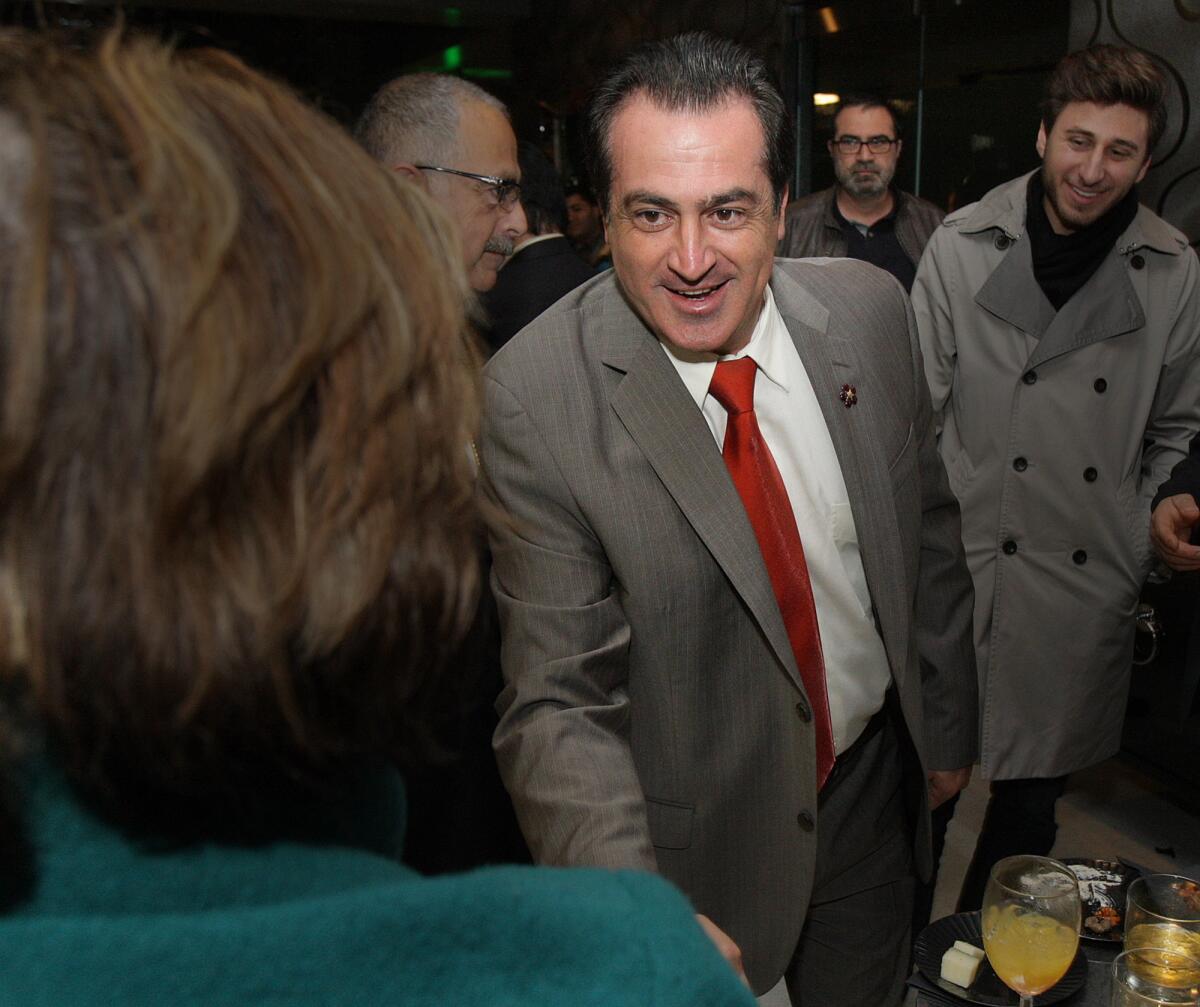
In mid-September, Glendale City Councilman Vartan Gharpetian publicly recounted an incident where he was allegedly ejected from a Royal Canyon Homeowner’s Assn. get-together because he is of Armenian descent.
“No one deserves to be treated the way I was treated at that event,” Gharpetian said during a council meeting.
Glendale Mayor Ara Najarian said he and his wife, Palmira Perez, were asked to leave as well. After initially reserving judgment, Najarian said the following week he thought it may have been because his wife is Mexican.
Beth Volpe, president of the local homeowner’s association, denied the accusation.
According to Volpe and several other members of the association who were at the organization’s Summer Social event, it was all a misunderstanding.
The get-together is the association’s sole members-only event. It requires an affirmative reservation and is meant to be nonpolitical in nature, Volpe said.
“I’ve seen racism in the community but not in this organization,” said Armine Hacopian, who is of Armenian descent and sits on the association’s board. She was at the event but not directly involved in the incident.
Complicating the matter further, Councilwoman Paula Devine was invited to the event to present a commendation from the city. Devine, who left before Gharpetian and Najarian arrived, is a member of the association, Volpe said.
Regardless of the association’s motivations, it “was in the wrong,” Devine said about a week after Gharpetian made his first statement.
City officials have estimated that nearly 40% of Glendale’s 200,000 residents are Armenian American. That would make it the largest community of Armenian Americans in the United States.
As the matter was discussed during City Council meetings for several weeks, both on the dais and during public comments, residents expressed solidarity with both sides.
Najarian said the incident exposed divisions within the city that many haven’t accepted and reckoned with.
Gharpetian pitched the idea of adopting citywide programs or training to combat discrimination and prevent similar incidents in the future.
“I’ve been criticized for speaking the truth, and I’ve been praised for my bravery,” Gharpetian said of coming forward with his accusations. “But none of this matters if we don’t do anything about it.”
Glendale’s city staff members are currently looking into ways to address the issue, per Gharpetian’s request.
Elevator breakdowns leave some senior residents stranded
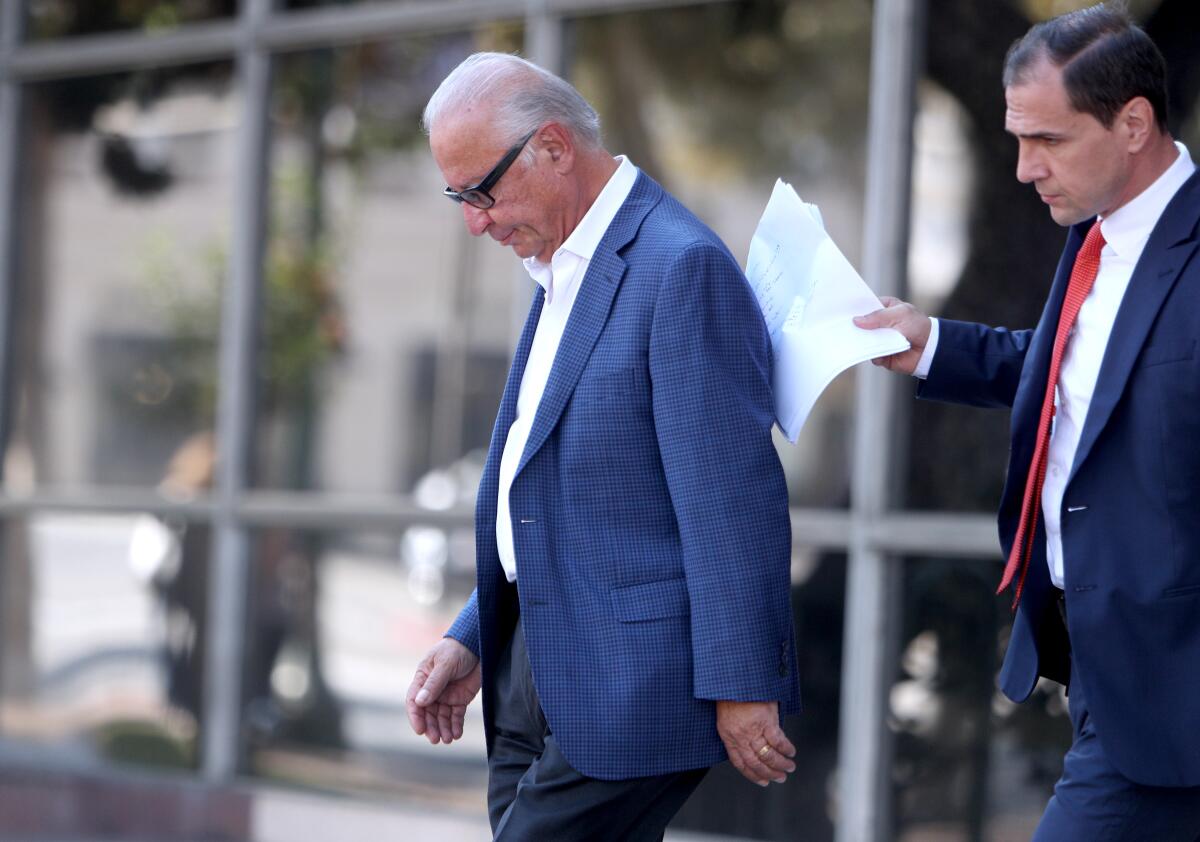
Over the Memorial Day holiday, dozens of seniors living in a Montrose apartment complex found themselves stranded, or nearly so, in their second- and third-floor units after the complex’s remaining functional elevator broke.
For nearly two weeks, several tenants at the Honolulu Manor Senior Apartments who were not able to navigate the several sets of stairs leading up and down to the street level had to stay put. Some reported missing doctor’s appointments due to the confinement.
“We’re just stuck here, and it’s scary,” resident Michelle Head, 72, said at the time.
The complex’s other elevator had broken down in October 2018 and had not been repaired. It would take until this past October, about a year later, for landlord Elias Shokrian to repair that elevator.
The incident prompted the city to slap Shokrian with a criminal misdemeanor lawsuit for violating the city’s building code. Shokrian pleaded not guilty to the alleged violations.
Several residents have filed a separate civil case against Shokrian, alleging elder abuse, age discrimination and negligence. That case is currently in the discovery phase.
After more than seven months, the city’s suit still has not wrapped up.
While one elevator had been fixed by the most recent hearing date in November, the remaining elevator was not up to code. It was operational, but did not always stop at the right level and sometimes shook, according to Glendale inspectors.
All mechanical devices on a property must be functional, according to a section of Glendale’s building code.
Shokrian said he has been doing everything he can to get the elevators up and running.
“We take care of our properties. We aren’t slumlords,” Shokrian said in October.
The next hearing date for the city’s suit is set for Jan. 16 at the Glendale Courthouse.
Triple homicide reported in Adams Hill neighborhood
A triple homicide shocked the quiet Glendale neighborhood of Adams Hill on April 18 when the bodies of 36-year-old Deandre Tyronne Sims, 35-year-old Christian Marty Moukam and 50-year-old Leon Gough II were discovered inside a home early that morning after police received reports of gunfire in the area.
According to police, at the time, all three men had died from gunshot wounds.
In early June, authorities announced four men had been arrested in connection with the homicide.
Two of the men, 23-year-old John Poh and 22-year-old Jordon Byrd, were arrested in Tennessee, while the other two, 23-year-old Franklin Sadler and 23-year-old Jacob Jamora, were arrested in Canoga Park.
Sgt. Dan Suttles, a police spokesman, said investigators think the deaths were the result of a targeted home-invasion robbery that turned into a murder.
‘Welcome to Glendale’ sign eventually taken down
Less than two years after being installed by the city, the lone remaining “Welcome to Glendale” sign that greeted motorists along Foothill Boulevard was permanently removed in July.
Glendale officials removed the sign near Pennsylvania Boulevard after a car crashed into it in May, cracking the marker in two. Authorities said it was easier to remove the concrete sign than to repair it.
The sign was one of two installed along Foothill in late 2017. The other one was installed near Lowell Avenue.
Their installations, costing a combined $80,000, faced a backlash from several local residents, with some arguing that the signs failed to reflect the surrounding La Crescenta and Crescenta Highlands community.
Others said the small concrete islands the signs were placed on were safety hazards.
Within a month of their installations, a vehicle struck the Lowell sign in a hit-and-run collision.
Although the city installed safety measures after the first incident, two more cars struck it before officials made the decision to remove the Lowell sign in December 2018.
The collision at the Pennsylvania sign was the first time the marker had been hit.
Glendale couple faces fertility mix-up
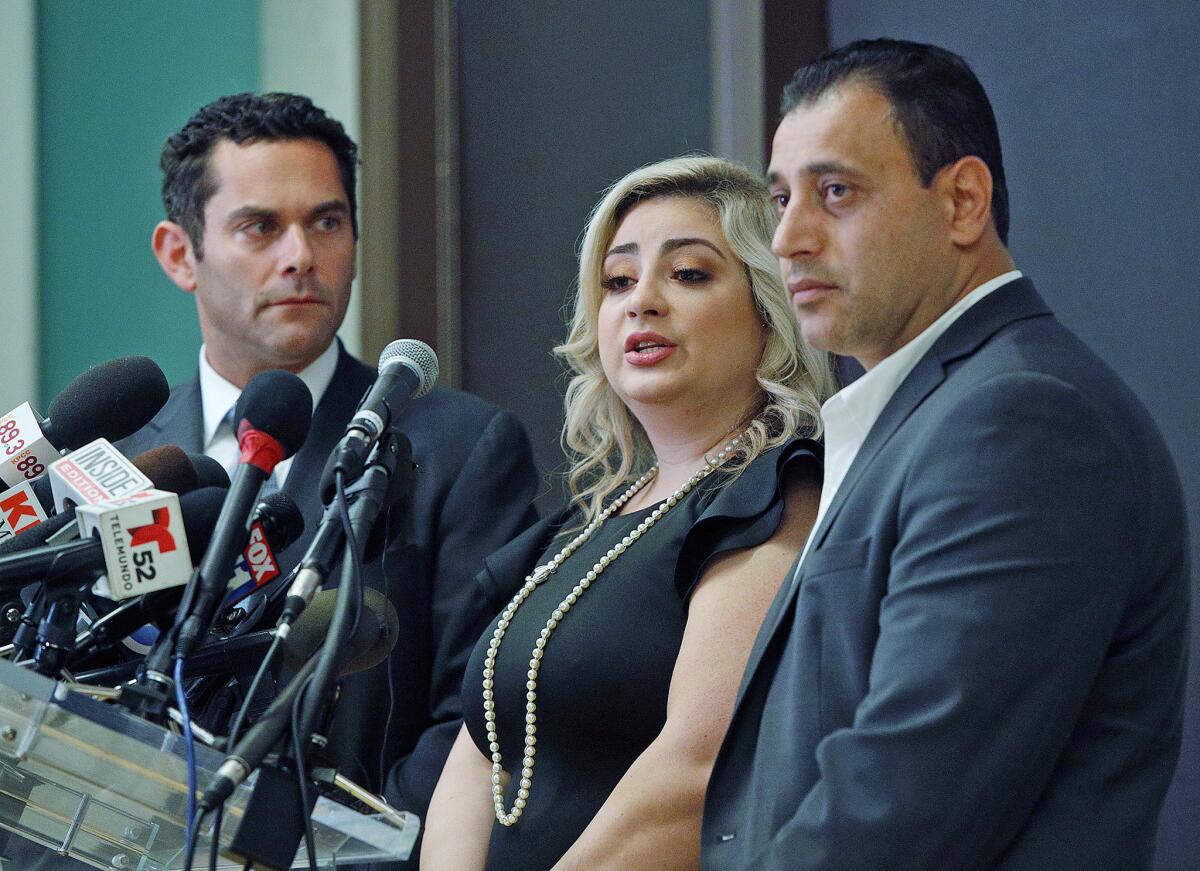
A Glendale couple’s worst fears were realized earlier this year when a fertility clinic told them a woman in New York gave birth to their son in March after being mistakenly implanted with one of their embryos.
Anni and Ashot Manukyan had gone to the CHA Fertility Clinic before the successful birth of their daughter and were hoping a second round of in vitro fertilization treatments with them in August 2018 would result in a son.
None of the embryos implanted into Anni Manukyan resulted in a pregnancy.
However, around April, they were called back to the clinic for DNA testing.
The couple claimed clinic employees initially evaded their questions about the testing before eventually telling them the truth: A woman had been implanted with two embryos belonging to two different couples and had given birth to two boys.
One of the boys was biologically the Manukyans’.
Six weeks after his birth, and after suing for custody, the Manukyans met their son for the first time in the lobby of a hotel in New York City.
In July, they filed a lawsuit against CHA Fertility and called for stricter federal oversight on fertility centers across the country.
Glendale Unified dismisses Supt. Roberson, deals with turbulent year
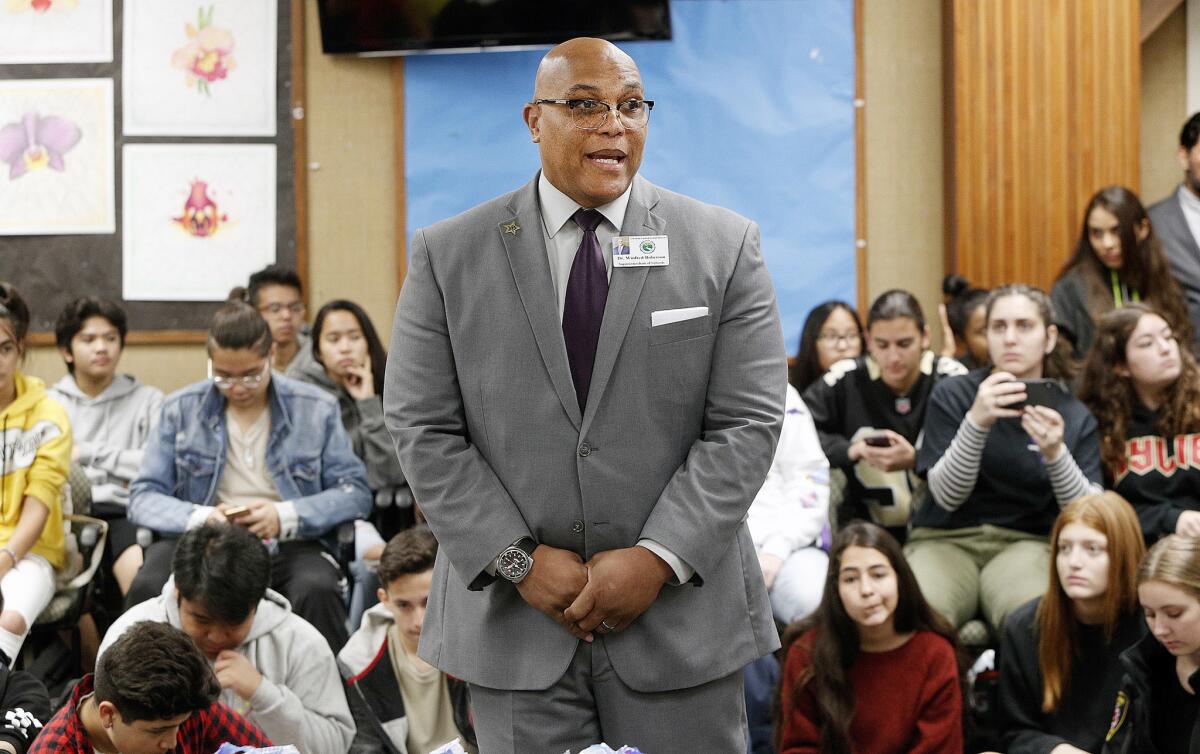
The Glendale Unified School District received a lot of bad news in 2018 — declining enrollment, a property- transfer proposal denied by local government officials, a qualified budget that confirmed dwindling reserves and struggles to keep a sliver of its territory in La Cañada Flintridge from breaking away.
Also, there was a student brawl on the campus of Hoover High School in October 2018 that resulted in more incidents, though not violent, in the next two months.
Those incidents occurred on the watch of Winfred B. Roberson, the district’s first African American superintendent, who was dismissed from his position via a 3-2 closed-session vote by the board of education on Jan. 29.
Roberson’s tenure was the shortest by a district superintendent since Norman Whytock, who served for 10 months in 1937.
Roberson was hired this past summer as principal of Mariposa Elementary School in Ontario.
Glendale Unified hires its first female, Armenian superintendent
The search for Glendale Unified’s 18th superintendent in its over 100-year history began after the dismissal of Winfred B. Roberson in late January.
The district, which, in the past, has hired male superintendents, hired Los Angeles Unified veteran Vivian Ekchian, a 20-year Glendale resident of Armenian descent, to take over the position in mid-May.
Ekchian briefly served as an interim superintendent of Los Angeles Unified, the second-largest school district in the country, during her service at that district, dating back to 1985.
She also held positions such as human resources chief and chief labor negotiator for Los Angeles Unified.
Her contract is for four years with a base annual salary of $310,000.
Glendale Unified loses Sagebrush decision
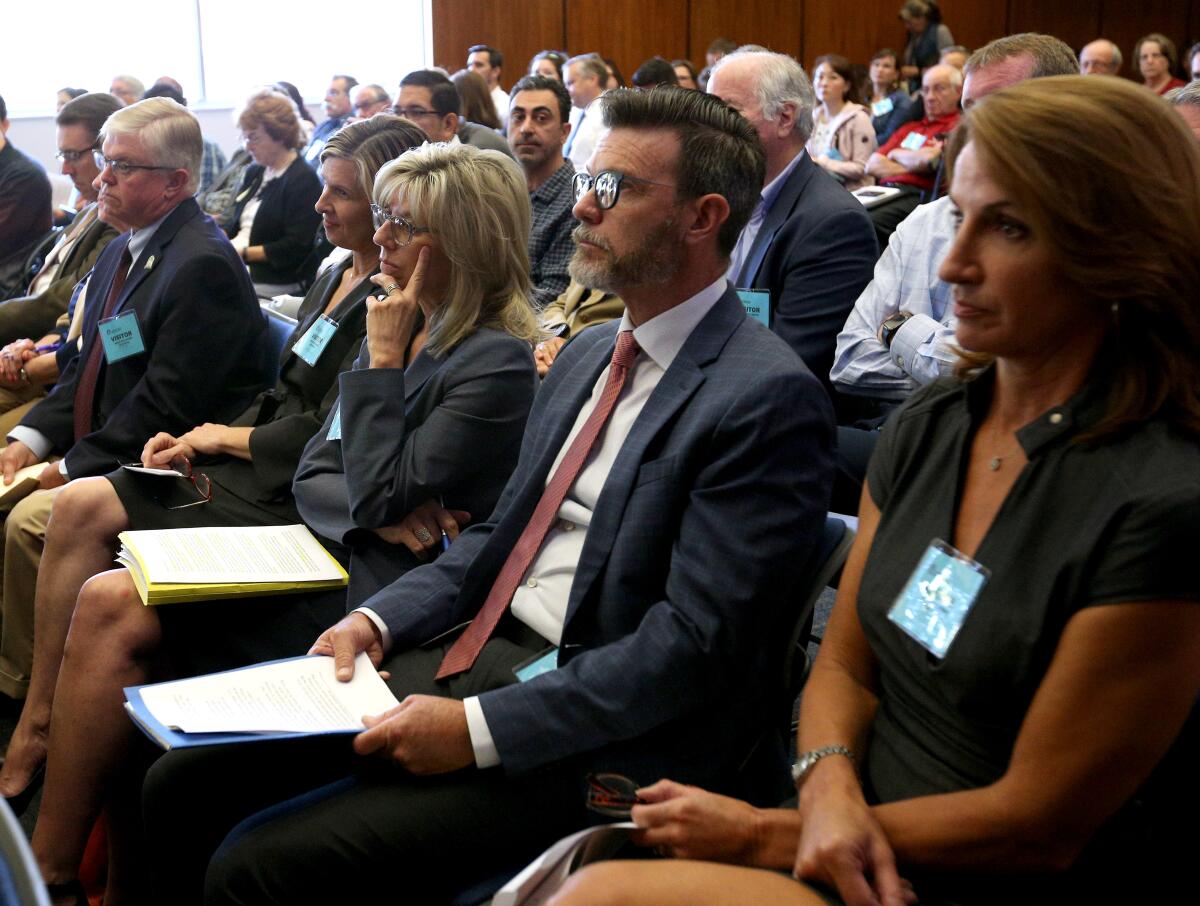
A decision on Oct. 2 overturned decades of precedent when the Los Angeles County Committee on School District Organization voted 6-3 to accept a petition filed by a La Cañada grassroots organization to transfer a small portion of western La Cañada Flintridge, called Sagebrush, from Glendale Unified’s control to La Cañada Unified.
The vote countered a county staff recommendation to deny the petition and delivered a victory for a group called UniteLCF, which began the petition process on Nov. 23, 2015.
The breakaway attempt was the fourth by various La Cañada residents and entities since 1961.
The Sagebrush area is roughly a 380-acre, 900-parcel territory of 783 homes located entirely within La Cañada Flintridge’s city limits that has been a part of Glendale Unified since the 1940s.
A California Environmental Quality Act study was ordered by the county in 2017 and found that between 151 and 355 students would be affected by the transfer and that deficit-spending Glendale Unified would lose between $2 million and $2.7 million annually.
What remains in the transfer process, at least from the county committee’s perspective, is to determine which residents would be eligible to vote in an upcoming election to determine if Sagebrush should separate from Glendale Unified.
The committee is expected to meet early next year to decide the voting area, which may consist of parts of or all of Sagebrush, Glendale Unified and La Cañada Unified.
For its part, Glendale Unified has filed a legal appeal with the county, while also bringing a lawsuit in Los Angeles Superior Court challenging the results of a mitigated negative declaration conducted during the environmental study.
Local college returns student identification card fees after News-Press investigation
Glendale Community College ceased collecting a $10 fee for student identification cards this summer after the institution was informed by the Glendale News-Press that it was potentially violating a state protocol.
The school said it would immediately refund any student who paid the fee since July 1.
The California Community College state student handbook notes “a district cannot charge a mandatory fee for a student identification card.”
Until this past August, Glendale Community College had “asked” all first-time students to purchase an ID card, according to the school’s website.
While possession of a student ID card is not necessary for enrollment or attendance at Glendale Community College, there was an equity issue.
Students without cards didn’t have the same access as their peers who do and may not be able to check out books or computer laptops from the school’s library.
While it’s uncertain when the state protocol banning student IDs was first implemented, local college officials think there was a breakdown in the process between auditors and school administrators.